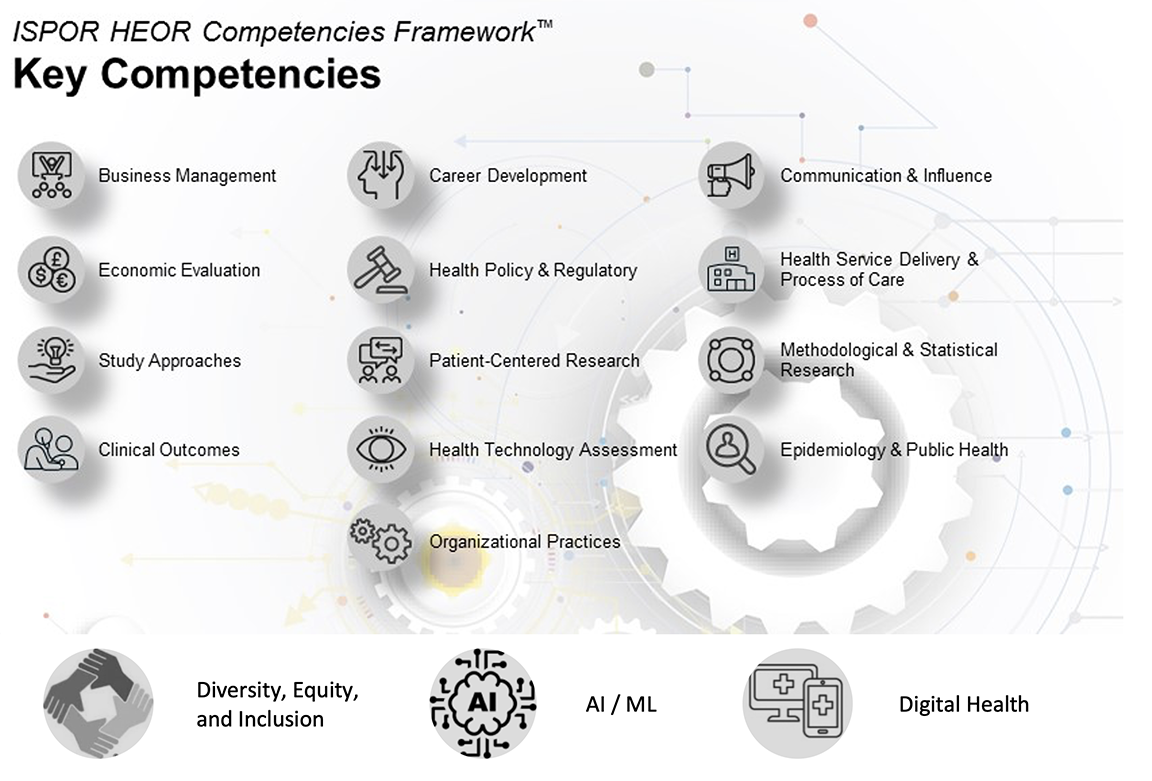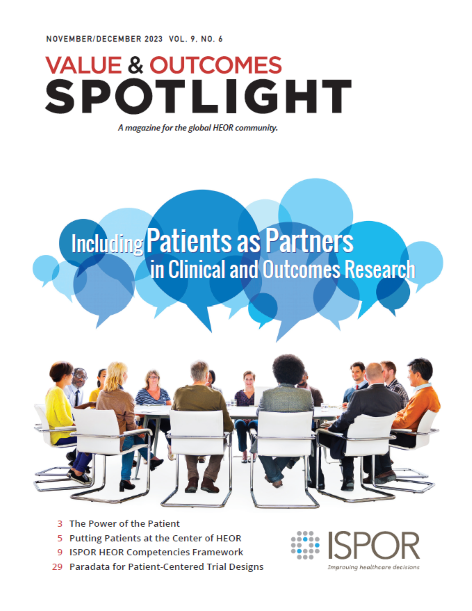The ISPOR HEOR Competencies Framework: Updates Underway
Annesha White, PharmD, PhD, University of North Texas, Forth Worth, TX, USA; Soham Shukla, PharmD, MS, GSK, Collegeville, PA, USA
The discipline of health economics and outcomes research (HEOR) has evolved over time with many advances in the field that reflect the need for uniquely skilled professionals to create, implement, and evaluate the different aspects of HEOR. Core competencies are an essential prerequisite for establishing HEOR as a professional discipline. Competencies refer to the technical, social and ethical, and personal and professional skills needed to develop a capable HEOR workforce. Competencies may serve as a guide for professionals on the knowledge, attitudes, and behaviors needed to perform effectively in the HEOR discipline. Competencies can also serve to help identify strategies for career growth while pointing professionals towards development opportunities for the future.
In 2020, the creation of a set of competencies for HEOR leveraged the expertise and perspectives of ISPOR members through a collaboration between ISPOR’s Institutional Council and Faculty Advisor Council to identify and validate the ISPOR HEOR Competencies Framework (CF).1 The process included natural language processing to examine competencies included in ISPOR Career Center HEOR job postings, qualitative input from a focused Institutional Council–Faculty Advisor Council work group, and quantitative input from 3 surveys: (1) a general member survey to assess importance and relevance of each competency, (2) a faculty member survey to assess the extent to which HEOR graduate degree programs cover the competencies, and (3) a student member survey to assess exposure to the competencies. Beth Devine, PhD, a member of ISPOR’s board of directors, commented, “Our field is so broad and vast that there is a need to establish focus and benchmarks for competencies in each subfield of HEOR. Because our field is evolving so rapidly, there are many uses for the Framework: to guide curriculum in academic programs as they are continually updated, to inform lifelong learning topics for all HEOR professionals, and to assist hiring managers to set benchmarks for competency in employment opportunities.”
As the HEOR field advances, so do the job types and the breadth of topics in which professionals must demonstrate competence. Therefore, updates to the CF are necessary to ensure their currency and comprehensiveness. Jim Murray, PhD, a co-chair of the original work group, commented, “HEOR has evolved into its own unique discipline separate from its foundations (eg, health systems research). It is a complex discipline comprised of many different competencies that have not been previously defined. The ISPOR Competency Framework is intended to not only define the HEOR competencies but also to identify the skills and experience needed for practitioners in the HEOR field.”
In the current CF, there are 41 competencies organized into 13 key competency domains. Three additional topics will be added in this update (Figure).
Figure 1. Competency Domains and New Topics

The process to update the CF involved convening a 10-member diverse group of HEOR representatives to comprise a work group charged with systematically reviewing the existing competencies, suggesting new competencies, and reducing the number of targeted competencies for this update. A 15-member review team of experts in the HEOR field was also brought together to provide additional input, review, and feedback. Meetings before, during, and after the 2023 ISPOR annual conference revealed some similarities in HEOR responsibilities of the past, but also some contemporary differences that signal an evolution of the profession.
- Diversity, Equity, and Inclusion (DEI): Although building competence in DEI is a journey and not a destination, this work provides a standard set of expectations or outcomes. These DEI competencies relate to data collection, systems-level changes, advocacy, policy changes, and role modeling to incorporate into local environments, education, and training. Work group member Eberechukwu Onukwugha, MSc, PhD commented, “As with many STEM (science, technology, engineering, math) fields, there is a need for greater diversity and representation across the continuum of education, training, employment, and leadership opportunities in the HEOR field. Diversity of thought and perspectives enriches our classrooms, collaborations, meeting spaces, and boardrooms. Inclusion of DEI principles within the HEOR competency framework acknowledges the work on disparities, access, and healthcare delivery that has been conducted to date by HEOR professionals worldwide and lays the groundwork for future innovations in how we design, conduct, and amplify HEOR.”
- Artificial Intelligence/Machine Learning (AI/ML): AI refers to the broader field of creating systems/services that can perform tasks that typically require human intelligence. ML is a subset of AI, representing a family of statistical methods that focuses on data regression, classification, ranking, and prediction. As modern healthcare data have massive volume, rapid turnover, and complex multidimensional structures, they require efficient methods to generate evidence where traditional approaches are limited or costly. Work group member Katarzyna Wac recently commented on the growing importance of this competency, “HEOR professionals need skills to manage the exponential growth of the AI-based approaches to understand how the evidence was derived and how to systematically approach the growing use of machine learning in the field.”
- Digital Health: The term “digital health” is broad and can include electronic medical/health records, telemedicine, mobile health, and wireless health. Utilization of digital health technologies provides opportunities to increase the quality of care and accuracy of healthcare analytics, and ensures greater safety for the patient.
- Statistics and Analytics: This area exists in the current Framework as a single competency under its own domain. However, given its broad scope and importance/relevance to HEOR, it will be expanded upon in the update into multiple specific competencies based on a separate project to identify topics in statistics and analytics led by Onukwugha and colleagues.
As an outcome, the complete update of the CF will be published and available on the ISPOR website in 2024. A draft of the updated CF is complete and ready to be vetted via an ISPOR general member survey. The general member survey will be administered to the ISPOR membership at large, including faculty and students, to obtain members’ opinions on (1) the importance of each competency to the overall HEOR discipline, and 2) the relevance of each competency to the specific job held by the respondent. Future plans include promoting the use of the competencies among researchers, academicians, practitioners, and the next generation of HEOR professionals. To this end, the work group launched the updated competency framework general survey in September 2023 to reverify the relevance and importance of each competency and subcompetency. In addition, comments were sought during the 2023 ISPOR Europe conference. After soliciting external reviews/comments and critically analyzing the feedback, recommendations will be finalized.
Please reach out to the ISPOR work group co-chairs Annesha White (annesha.white@unthsc.edu) and Soham Shukla (soham.h.shukla@gsk.com) with any questions or feedback.
Reference:
1. Pizzi L, Onukwugha E, Corey R, et al. Competencies for professionals in health economics and outcomes research: The ISPOR Health Economics and Outcomes Research Competencies Framework. Value Health. 2020;23(9):1120-1127. doi: 10.1016/j.jval.2020.04.1834
Acknowledgements:
We would like to thank the ISPOR work group members for their contributions to this update: Beth Devine, Eberechukwu Onukwugha, Husam Albarmawi, James Murray, Julia Sljeko, Katarzyna Wac, Laura Pizzi, Samantha Valliant, Darshini Shah, Abeer Al Rabayah, Hemant Phatak, Rafael Alfonso, Khalid Kamal, Stephanie Earnshaw, Ambarish Ambegaonkar, Anita Burrell, Stacey Kowal, Zeba Khan, Mohin Chanpura, Huang-tz Ou, Maarten Ijzerman, Adaeze Amaefule, Tsung-Ying Lee, James Ryan, Ajibade Ashaye, Sam Gautier, and Mary Rehm.

